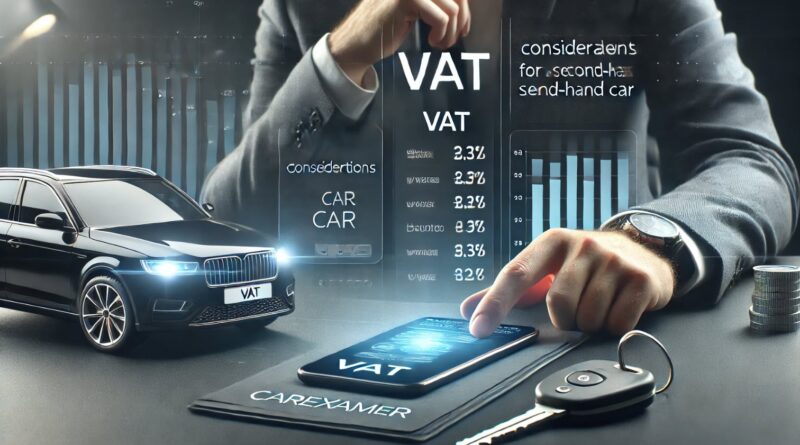Is There VAT on Second-Hand Cars? Here’s What To Know
Let’s break down when VAT on second-hand cars applies, how it works, and what it means for your budget. If you’re on the hunt for a second-hand car, you might be wondering if VAT (Value Added Tax) will bump up the cost. The good news? Most of the time, when buying a used car in the UK, you won’t be paying VAT. But there are some exceptions to keep in mind, especially if you’re buying from a dealership or if the car had a previous life in business.
When Does VAT Apply to a Second-Hand Car?
In most cases, if you’re buying from a private seller, VAT won’t be involved. Private sellers aren’t VAT-registered, so they don’t need to charge it. However, VAT can come into play in a few situations, especially if you’re purchasing from a dealership or the car has a business background. Here’s the breakdown:
- Private Sales: No VAT here. The price you agree on is the final price—no extra VAT to worry about.
- Dealership Sales: Things are a bit more nuanced. Dealerships sometimes use the VAT Margin Scheme or apply standard VAT, depending on the car’s background.
- Ex-Business or Fleet Cars: If the car was previously a company vehicle, rental car, or part of a fleet, VAT may apply if you’re buying from a dealership.
What Is the VAT Margin Scheme for Second-Hand Cars?
Dealerships often use the VAT Margin Scheme for second-hand cars, which can keep costs down for buyers. Here’s how it works:
- VAT on the Profit Only: Under the Margin Scheme, the dealer only has to pay VAT on their profit margin—not the entire sale price. For instance, if a dealer buys a used car for £5,000 and sells it for £6,000, VAT is only charged on the £1,000 profit, not on the £6,000 total.
- No Extra VAT for the Buyer: As the buyer, you won’t see extra VAT tacked onto the final price—it’s already included. This scheme keeps prices lower compared to a full VAT charge on the car’s entire value.
- Why It Exists: This scheme was created to keep second-hand car prices competitive. If dealers had to add VAT to the total sale price, it would make used cars much pricier.
When Is the Standard 20% VAT Rate Applied?
There are cases when the standard 20% VAT rate does apply to second-hand cars, especially when the car had a life as a business asset. Here’s when you might see that extra charge:
- Ex-Lease or Fleet Cars: Cars that were leased or part of a business fleet often come with 20% VAT when they’re resold by a dealer. This is because the business that previously owned the vehicle likely claimed VAT on it.
- Dealer Demo Cars: Vehicles that were used as dealership demo cars may also have the standard VAT rate applied, as these are considered business assets.
- Commercial Vehicles: If you’re looking at a van or other commercial vehicle that was used for business, you may see the standard VAT charge as well.
In these cases, VAT will be added on top of the sale price, which can make these vehicles a bit more expensive.
Budgeting for VAT on Your Used Car Purchase
VAT can make a difference to the final price of a used car, especially if you’re buying from a dealership with ex-business vehicles. Here’s how to stay prepared:
- Ask the Dealer About VAT: Don’t be afraid to ask if VAT applies, especially if the car you’re interested in used to be a fleet or rental vehicle.
- Check if You Can Reclaim VAT: If you’re VAT-registered and buying the car for business, you may be able to reclaim the VAT on some vehicles. Just be sure to ask for a VAT invoice to make this easier.
- Compare Prices Carefully: When looking at different dealerships, remember that cars with VAT added will usually be more expensive. Knowing when VAT applies can help you spot the better deals.
VAT on Imported Second-Hand Cars
If you’re importing a second-hand car into the UK, VAT (and other import fees) are usually unavoidable. Here’s what to know:
- Importing from Outside the UK: Cars imported from outside the UK, like from the EU or the US, will incur VAT at the standard 20% rate upon entry.
- Import Duty: In addition to VAT, you might have to pay import duty, which is based on the car’s value.
- Classic Car Exceptions: Cars that are over 30 years old may qualify for a reduced VAT rate or even be exempt from import duties, depending on their condition and intended use.
How to Find Out if VAT Applies to Your Used Car Purchase
Wondering if VAT will be part of the cost for the used car you’re eyeing? Here are a few ways to check:
- Ask the Seller: Dealers are required to tell you if VAT is included in the sale, so be sure to ask before you commit.
- Check the Ad Details: Many dealers will specify whether VAT is included or additional in their ads. If it’s not clear, reach out and ask.
- Look at Your Invoice: When VAT is part of the deal, it should be itemized on your invoice, so you know exactly what you’re paying for.
Final Thoughts
In most cases, buying a second-hand car won’t involve VAT, especially if you’re buying privately. But if you’re shopping at a dealership, or looking at an ex-business or commercial vehicle, it’s worth double-checking if VAT applies. Being aware of when VAT is added can help you plan your budget more accurately and avoid any unexpected costs. Happy car hunting!
Buying a used VW. Buying used vauxhall, BMW, Jaguar, Ford, Volvo, Range rover, Bentley, Aston Martin, Porsche, Ferrari, Lamborghini, Maserati, Hyundai, Tesla, Honda, Pagani

